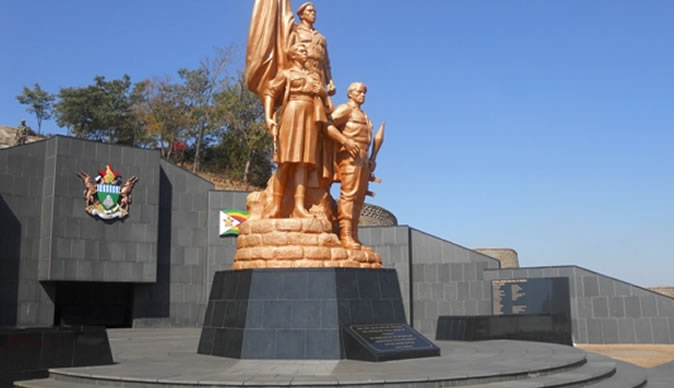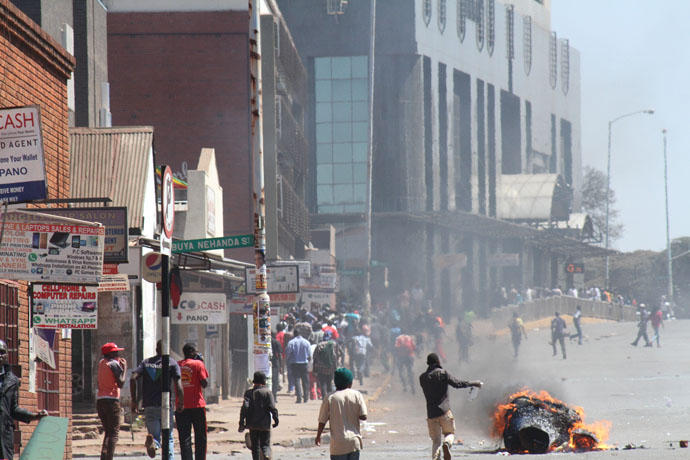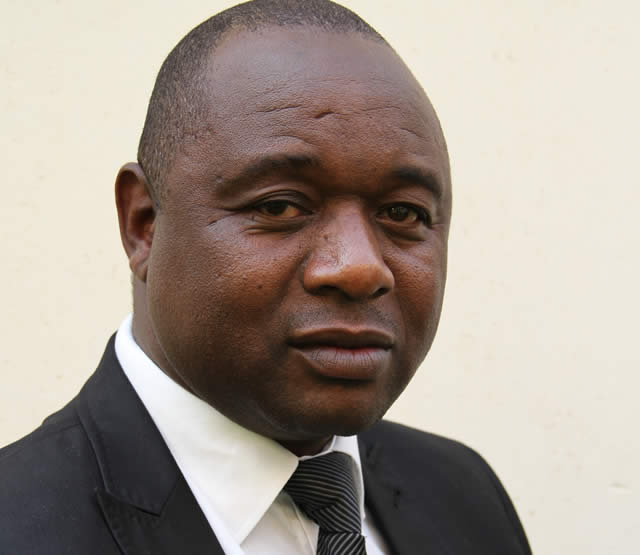Success is fruit of sacrifice


Many gallant sons and daughters of Zimbabwe left the comfort of the fruits of their personal accomplishments in life to go and fight for the liberation of the country
Reason Wafawarova on Monday
Zanu-PF is not an unpopular political party to warrant the threat of a popular uprising, and it is precisely on this basis that violent protests by youths from the opposition will only result in ruthless extinguishing.
WE certainly do not have the right politics for our domestic affairs, and this is why we have this deteriorating situation that has badly damaged our social and economic fabric.
What Zanu-PF, the ruling party has articulated so well and eloquently since the launch of the regime change drive by the West is the foreign policy position that says Zimbabwe is no pushover in matters concerning sovereignty, and that the country has a solid defence mechanism against any effort to reverse the political gains of independence.
However, we cannot brag of the same assertiveness and eloquence of policy in the area of developing our economy, of course badly affected by the adverse effect of engineered international isolation, especially by the global lending institutions.
In June 2015 Vice President Emmerson Mnangagwa was reported saying, “It is important that we remain proud as a nation and as a people,” adding “we will not do anything that removes that pride because as a people we are independent and sovereign.”
The pride of any nation is not granted and given. It is earned. It needs preservation by its own people. We have a shared dream for equality of humanity across the nations, and all the peoples considered by the West to be lesser beings share that dream.
We desire to be equal partners in international affairs, but it is important that equality of humanity starts with our domestic politics, with how we respect our own freedoms, our own democracy, our own constitution, and indeed how we respect our own people.
Freedom and democracy are expensive. They are born out of self-sacrifice for the collective good of national progress.
Our position in international affairs under the leadership of President Robert Mugabe is no guessing matter. We are known to be an uncompromising nationalistic country that will not bend backwards on matters of sovereignty and independent nationalism.
Aid politics and puppet politics have not changed that position over the past 16 years, and we can see a shift where our Western-backed opposition is advocating unconstitutional means of toppling the Government. Clearly that is a cruise for bruises that will not yield anything beyond injurious skirmishes.
Zanu-PF is not an unpopular political party to warrant the threat of a popular uprising, and it is precisely on this basis that violent protests by youths from the opposition will only result in ruthless extinguishing.
The threat that Zanu-PF must worry itself about is not in its external opponents at the moment. Zanu-PF’s biggest letdown is its own internal lack of seriousness and commitment to leadership duties.
The party is not an employment agency, and as such it must not nurture or breed people whose only motivation for leadership roles is to make money — people who view a parliamentary seat as nothing more than a job with a car package and a salary.
Leading people is a sacrifice. It is not about personal privileges and gain. It is a fact of politics in Africa that would-be politicians are motivated by personal greed. There is no iota of hope that the greed factor in our politics will change with a change of government. It is a culture that has to change across the political divide, and the only way it can change is when we get to that point where political power is controlled by constitutional accountability institutions.
Others have joined our politics because they are simply obsessed with the idea of fame and recognition. They die to see their faces on television screens, and to read about themselves in newspapers. They enjoy excessively this vacuous sense of accomplishment that comes with cheap publicity.
Probably such miscreants make up to half our Parliament. There is one particular Cabinet Minister who had more than a dozen Press conferences in the first six months of being appointed, each time trying so hard to stir attention seeking controversy, even picking fights with fellow Cabinet Ministers.
What the nation needs are leaders who step up to lead because they want the country to be a better place for all its citizens — leaders who want positive change for the collective good of all others.
Joshua Nkomo, Herbert Chitepo, Samuel Parirenyatwa, Robert Mugabe and many others left the comfort of the fruits of their personal accomplishments in life to go and help lead the fight for the liberation of the country, to help provide leadership to the thousands of young freedom fighters that had left family, friends, and schools to make sure that colonialism was terminated and never to return.
There is a cost to leadership, and every successful leader has to pay that cost. As a leader rises in leadership, responsibilities must increase, and rights must decrease. The people of Zimbabwe are now sick and tired of paying the cost for leadership of the country. It has become an investment with no returns.
No longer must we entertain leaders whose responsibilities decrease with the rise of their power in leadership. No longer must we tolerate leaders whose rights increase above ours on the mere basis that they are in leadership.
Leadership is about sacrifice, and sacrifice is not a one off event. It is an ongoing process that every successful leader will have to put up with, and the higher the level of leadership the greater the sacrifice one has to make.
Vice President Mnangagwa went to China in last year, he was reported to have said:
“You cannot say there are areas of our economy which we are happy with, infrastructure we are behind by 15-16 years, agricultural development the same, manufacturing, in fact capacity utilisation in some areas of our industry it is down to 20 percent, so again we have to retool by acquiring new machinery, technology and machinery so that we are competitive.”
What he was lamenting was not exactly the lack of money or resources. He was lamenting lack of leadership. We know there is no success without sacrifice, and the question we want to ask ourselves is what has been the sacrifice from our leadership to ensure that agricultural development, or infrastructural development is a success?
We cannot expect some kind of miraculous agricultural development spearheaded by leaders smitten by the destination disease — leaders whose sole aspiration is to last five years in Parliament, or to make sure that they stay in Zanu-PF’s Central Committee or Politburo for as long as they are alive. Leadership is not the art of mobilising for the vote and the subsequent winning of elections.
Successful leaders must give up something for them to succeed, and any leader who cannot identify what they have given up in life is essentially a dangerous opportunist that must be kicked out of leadership for the goodness of the nation.
Activity is not accomplishment, and that is why distributing farmland and allocating residential land is not an end in itself. It is an activity that must be followed with accomplishment.
A lot of sloganeers and rhetoricians have been allowed to mistake their noise for accomplishment.
Our leadership must be reminded that there is no advancement or development without sound prioritisation. Good leaders are known for making good of well-set priorities.
Where did we place the resettled black farmer in the past 16 years? Where did we place investment at the peak of our political bickering with our equally harebrained opposition? Where have we placed the welfare of the nation when we obsess ourselves with the power politics that comes with succession politics?
We are a country that used to prioritise education and health over and above everything else we do, and now we are more preoccupied with how to settle wage bills for our civil service. What has gone wrong over the years, and do we have the courage to confront it?
We cannot confront this disastrous fate with the excuse of illegal economic sanctions from the West, much as they remain a major causal factor for our precarious predicament. Surely the West is not responsible for running the affairs of our country, and they equally cannot be the legitimate cause of the collective failure of our leadership.
The sanctions were put in place to fight our priorities, and what we needed to do to defeat the sanctions was to protect our priorities, not to complement the intention of the enemy. By sidelining agricultural development and the welfare of our masses, we were basically giving credence to the desired effect of the illegal sanctions. This is an economic war, just like we had a military war when we fought for our independence. We sacrificed our own blood then. What is the leadership sacrifice today? We cannot sacrifice our own people to face the biting poverty that comes with the ruthlessness of the illegal economic sanctions. Our people need protection from our leadership.
It is a known fact that political leaders do not easily practise the discipline of prioritising, and that is why we still import expensive cars for the luxury of our most esteemed leadership, even when we have no garbage removal trucks or ambulances.
The problem with our leadership is this misleading belief that when one is busy that means they are achieving.
Our politicians sometimes engage in very tight cross-country schedules to say sweet nothings to our desperate people, and they count that futility for achievement.
Prioritising requires leaders who think ahead. We hardly have any leaders in the country who think beyond winning an election.
A successful leader needs not only to know what is important, but also to know what comes first, and what comes next. What were our priorities at the peak of the Marange free for all diamond harvest? Did we plan what was to come first, and what was to come next?
The first responsibility of any successful leader is to define reality, and by that I mean the reality of what surrounds them?
What is required of political leadership is not that we may have rulers, and our leaders sometimes pride themselves in this fantastic imagination that we die to be ruled. It is frankly a disgusting philosophy.
We require good governance, and the key performance indicator for that is the prosperity of our nation, the hope and happiness of every citizen.
John Maxwell writes a lot about knowing the return on investment. What is the return on investment on our policies?
There is no second guessing on the benefit of the anticipated return for either the land reform policy or the indigenisation policy, but anticipating a huge benefit is way different from achieving it.
A successful leader is focussed on getting the reward for his decisions and actions, and such reward is defined by the collective benefit for the people led.
Zimbabwe we are one and together we will overcome. It is homeland or death!!
REASON WAFAWAROVA is a political writer based in SYDNEY, Australia









Comments